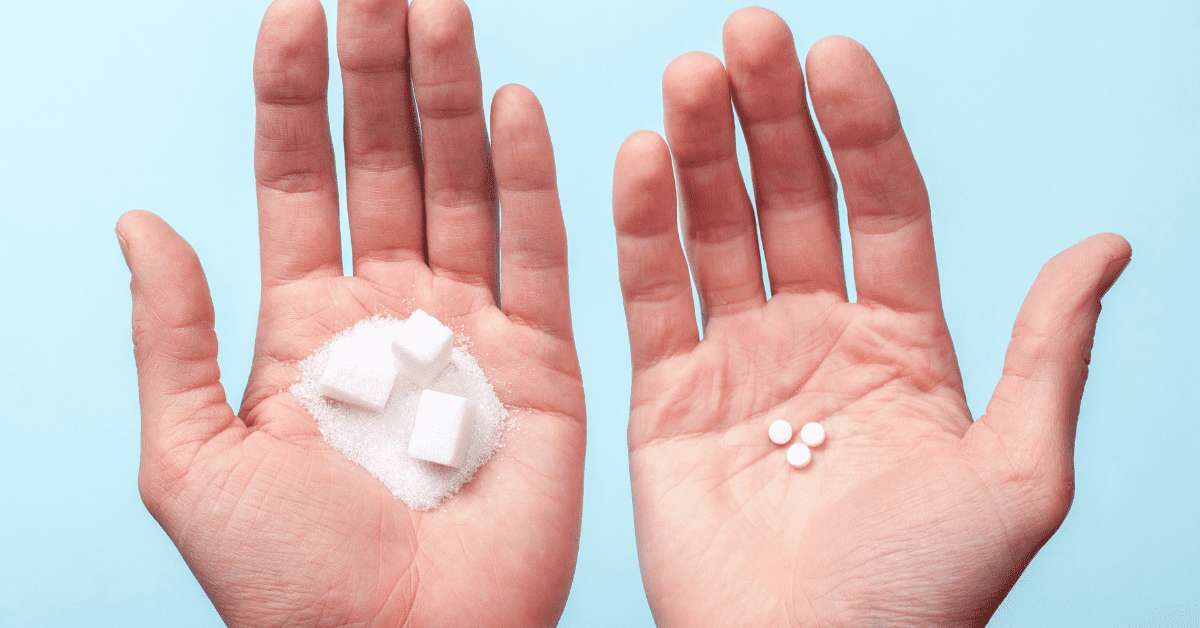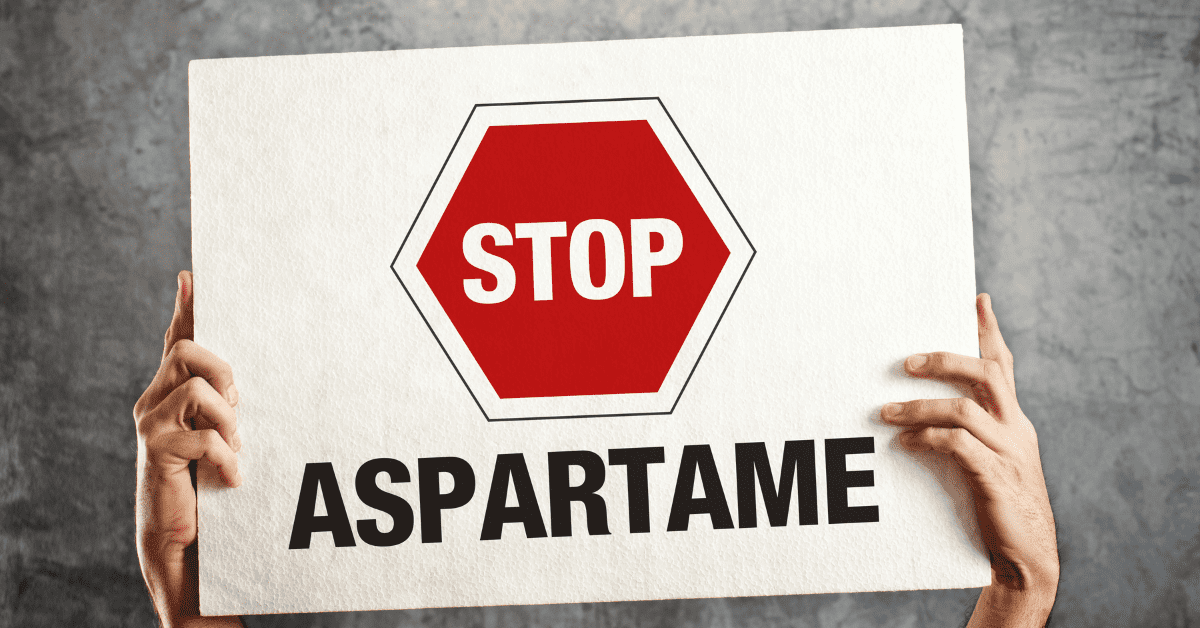“Aspartame” is like Jim Carey’s character in the Cable Guy. It’s that friend that you didn’t know you had… let alone want!
It is one of the most common sweeteners and flavour enhancers in use today.
It has been in low-calorie, or sugar-free foods for over 25 years now. [1]
Yet, the U.S. FDA has banned Aspartame twice in the past! Somehow, today it is legal and consumed by millions on a daily basis.
But how can this be? Well, like a lot of legislations that are in place… the rich get richer – and the poor get poisoned!
First, let us take a short stroll through the history of aspartame…
In 1965, a chemist whose aim was to generate a cure for stomach ulcers, creates Aspartame by accident. The chemist’s employer, G.D. Searle, spots this as a potential money-spinner. So, they put it through a quick but dishonest testing process to get it approved by the FDA.
Over time, serious side effects began to appear. Following this and the results from three independent studies, the FDA chose to ban this sweetener in 1980… with the main concern being that it increased the risk of developing a brain tumour. Not only in those of us living, but in the developing foetus also. [2]
The following year, on 21st January 1981, G.D. Searle opted to apply for aspartame’s approval for use by the FDA once again. By this time, the FDA had a new commissioner, Dr Arthur Hull Hayes, Jr., who took it upon himself to approve its use. This involved overlooking the fact that aspartame had failed twice before. With a 5-person Scientific Commission declaring it unsafe on its first attempt.
It’s important to note that Hayes was a pharmacologist who had no previous experience with food additives. Therefore, it makes you wonder, what were Hayes’s incentives for approving aspartame.
How much of a role did money and corruption play after all? Especially when you consider the fact that Monsanto came and bought the aspartame patent from G.D. Searle. Why? Because this was in 1985 when Hayes was working for Burson-Marsteller, who was the public relations firm for both Monsanto and G.D. Searle.
Ironic to many. Plain obvious to some.
Click here for a more detailed look at this history.
Is aspartame dangerous?
Aspartame has been under constant criticism regarding its safety. Not only by consumers but also scientists, chemists and doctors. Still, national food safety agencies (e.g. the FDA, FSA, EFSA, Health Canada and FSANZ) all stand by its safety.
In fact, they all claim to have put aspartame through rigorous scientific reviews on its use in food. Yet, it is not hard to find research that shows opposing results.
Here is a short-list of arguments:
Sweeter than Sugar
The FSA claim that aspartame is an intense sweetener, which is about 200-times sweeter than sugar. Yet, a recent research paper indicates that it is no sweeter than the real thing [3].
Cancer-contributor
Even after pressure from the ERF, the EFSA still insists that aspartame does not cause cancer. In fact, they reviewed the ERF study and concluded, “the tumours probably occurred just by chance” [4]… a true head in hand moment.
Still, many studies warn of its cancerous hazards [5][6][7][8][9].
Damages the brain and nervous system – causing seizures
Health Canada states that aspartame does not harm the brain or nervous system at all in children or adults. This includes its link to seizures.
Yet relevant research suggests otherwise [10][11][12].
Causes weight gain
According to the EFSA, aspartame is in weight control products such as diet soda. But in actual fact, it can have the opposite effect [13][14].
* This is the short-list. There are many more ailments linked to aspartame. Use this as a starting point.
So, aspartame is dangerous?
Research that supports the safety of aspartame does exist [15][16].
Such researchers argue that the majority of studies showing negative results involve laboratory animals. Alongside doses greater than what people would consume in real life.
In effect, every study has its limitations. But this is not the biggest barrier researchers face regarding aspartame.
Their main issue is that the biggest consumers generally have other health concerns. Most of which have links to the same ailments as aspartame.
For example, diet soft drinks tend to appeal to people with excess weight and type-2 diabetes. Both of which can lead to cancer [17]. This makes it easy for scientists to point the finger in other directions.
As always, use this article as a starting point and continue to do your own research.
But, ask yourself, “If aspartame is so safe, why did Pepsi decide to ditch aspartame from its ‘Diet’ range?” [18] Was it bad for business, or a conscious decision?
Still, if in doubt, consider this…
The Pentagon once listed aspartame as a Biochemical Warfare Agent! [19][20].
Surely, if something was once a biochemical weapon, it is not suitable for consumption. Yet, this artificial sweetener is in over 6000 products worldwide today [15].
In my eyes, all food agencies need to re-check their position on aspartame before we all suffer the consequences – if we haven’t already.
Bad Gut Feeling
A 2018 study shows that artificial sweeteners like aspartame can be toxic to your gut bacteria. In particular, E Coli. [21] With its curly “amyloids” may play a role in triggering lupus. [22]
– Learn more: What causes Lupus –
Artificial sweeteners are promoted to help weight loss and prevent diabetes.
But they may do the opposite. Driving the development of “glucose intolerance” and “metabolic disease”. Two conditions with links to disease activity, damage, and future heart issues in those with lupus. [23]
How?
By changing the composition and function of your gut microbiota – the bacteria residing in your intestines. [24]
Final thought
One thing is for sure; Aspartame is one of the most tested food additives to date – and for good reason. However, it’s hard to trust the supporting research when you know its backstory. Especially with it once being owned by a toxic corporation like Monsanto. Who was bought out by Bayer.
As Pablo Escobar once said, ‘everyone has their price’. Unfortunately for us, this includes researchers.
So, to minimise any risk, choose natural foods and avoid man-made products. To me, it is by far the best choice.
“Due to the facts now known about aspartame, poisoning all who take. Wittingly or unwittingly and when it breaks into your system and messes with your instincts. Head space replication of your DNA. And it causes all your grief – Blindness, neurological disease. But they sell to the kids as sweets. Diet Coke costs less than a bullet for me”
Soom T – Dirty Money
If you liked this, please like, share and comment. Also, go check out my other articles to increase your knowledge, reduce your risks, and improve your health.
Copyright, Lupus to Health. May not be reprinted without permission.


Pingback: 5 Rotten Reasons Why Soft Drinks are Bad for You -
Pingback: 5 Hidden Health Benefits of Drinking Tea (2021) -